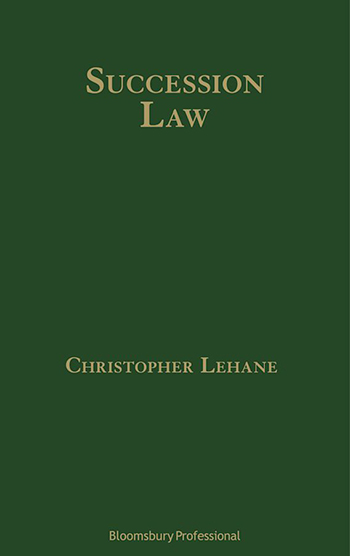Thanks. The book my ‘Magnus Opus’, was a four-year project but given I used notes from my lectures and officemanuals over my career, it is more like a 42-year one. As a court officer administering the law, my experience has always been from a practice perspective. With 22 years inthe Probate Office and 12 years as Official Assignee in Bankruptcy, I have gained a unique experience administering personal estate law. It straddles many areasof law wider than pure succession law mainly property, court procedures, conveyancing, tax, insolvency, trusts, family, limitation of actions and conflicts of law, all of which I cover in the book from a general and succession law perspective. I have sought as much as I can to write in plain simple English and drill down from substantive law into all aspects that can arise in practice sharing my knowledge and experience, which I believe will be of great assistance to all readers.
I am sure busy practitioners will welcome the clear structure of the chapter that categorises very simply the key aspects of a will, drilling down into each with comprehensive coverage of relevant law, court rule, practice directions and judicial decisions that explain and cover most issues that they will encounter in practice. It covers what a will is and the requirements to make, revoke, revive and construe a will. Each area is summarised to assist readers learn the essentials of the topic, as is topic coverage throughout the book.
As 95% of succession practice is non court and administrative, from my experience greater attention to detail in completion of forms would save considerable effort and cost for all involved. This requires training, use of templates, checklists and diligence in research and completion ofdocuments, so they are accurate and complete. The book will be of immense practical benefit forpractitioners with templates for testators for executors and for LPRs, simplifying the gathering of key estate details and many other checklists, template forms and tables of model titles to grants, assisting in legal drafting.
Yes, this was a chapter where I could share my knowledge of both succession and insolvency lawand I believe the clarity provided in the chapter will be very useful for practitioners, as it is a verytechnical and complex area. There are many risks for LPRs failing to administer estates correctlyand indeed for practitioners advising them, where creditors and beneficiaries are not paid inaccordance with the strict order of priority set out in the Succession and Bankruptcy Acts. Thechapter explains simply and comprehensively the law and practice, which no doubt will be muchappreciated by practitioners. Further chapters on bequests and legacies and how to complete estateaccounts with numerous account examples, will equally be much welcomed by practitioners.
Section 117 is the most litigated section of the Succession Act, given the section requires a Court application and order for a child to benefit in an estate. It is also a section that is under review following the Law Reform Commission (LRC) Report on it ‒ that will both increase and limit applications by children for relief under the section. In the book I analyse extensively how the courts have interpreted the section and what needs to be proved by applicants to succeed in their applications under s 117. I consider the reform proposals of the LRC and give my view of its proposals.
Firstly, buy the book.
1. Going back to mistakes that practitioners make and the extent to which succession law isadministrative form filling, I would repeat that use of checklists found throughout the book and themost general ones found at 6.21 and Appendices A and O save a lot of time, effort and costs.
2. In drafting wills for testators, take the instructions directly from the testator and ensure that nobeneficiary is in the room when instructions given and/ or will executed. If on the death of a testator,concerns are raised with you in relation to the testator or will execution, provide full and opendisclosure to party querying, as failure to do so will result in a court later if the will is challenged,awarding full costs to queriest ‒ partly or wholly due to your failure in being fully transparent at theearliest opportunity even if the will challenge fails.
3. Intestate succession to the estate of a deceased is determined at the date of death of thedeceased. Ensure that when establishing next of kin entitlements and accordingly right to extract thegrant, that you are querying client as of nearest kin alive at date of death of deceased and notcurrently when extracting grant.
Yes I did. The process gives you an opportunity to share your knowledge and experience and having the fulfilment of it being published was like passing an exam. I also learned a huge amount inhaving to get the detail of the book correct.
It reminded me of my teaching, as if you ever want to truly learn a subject, teach it. However, I never appreciated how intense the writing process would be, nor how long it would take and the release when it finally went for publication was wonderful.
I really enjoy the law and practising law has always been an ambition since qualifying in 1983.
Yes, I am but certainly Covid-19 has changed everyone’s life ‒ it has totally changed what I expected in going to the Bar.
Absolutely. As I say in my preface in the book, I was honoured that Peter Kelly ex-President ofthe High Court, agreed to do the foreword. It is like getting an ‘A’ from the master. I am thrilled and deeply honoured by it.
